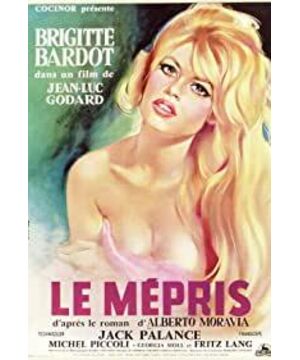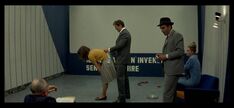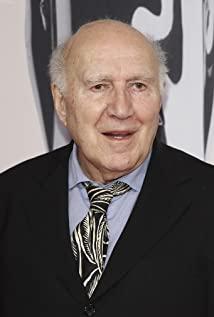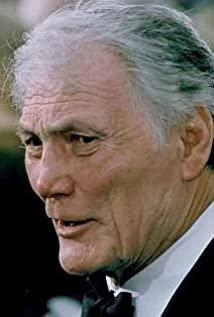It is easy for people to look down on others, no matter whether they hide it or speak out, people cover many steps in their hearts, and let themselves stand on the top and look down at each other. To be honest, this look is quite enjoyable. In fact, most of the time, most people just look down. Godard asked a question - why do you look down? His old man is a happy person, and he gives the answer directly. There are many kinds of contempt, and the reasons for contempt vary widely. In Contempt, Godard provides the source of contempt that arises in a particular situation, that is, power.
In the story of "Contempt", Godard designed abstract character identities: cutting-edge screenwriter, screenwriter's wife, producer, director, translator. The characters constitute two groups of relationships, the screenwriter and the wife constitute the husband and wife relationship; the producer and the director, the producer and the translator, and the producer and the screenwriter respectively constitute the employment relationship. Each group of characters in the film has an unequal relationship, hiding a power gap.
In the film, the characters form two groups of abstract character relationships: one is professional, and the people involved are running and clamoring for livelihood and so-called ideals, revolving around an epic film "Odyssey" with a large investment scale, a triangle-like According to one end of the pattern, the producer (and also the investor) Jerry - the master director Fritz Lang - the up-and-coming screenwriter Paul; the other group is in the family, with the so-called intimacy as the bond, in the big or small. Or in a small residence, two people in the name of "husband and wife", from fusion to split opposition, husband Paul - wife Camille.
The relationship between the two groups of characters is intertwined and coerced, from establishing power, to flattering power, and finally deconstructing power. During this period, contempt arose because of the different attitudes that different characters showed towards power. The core creator of the movie "Odyssey", the producer (and investor) - director - screenwriter, constitutes a delicate power relationship. In this ecology, the power gap is huge, and the characters are under pressure in the face of this gap. What they say and do, as well as cover up and justify their words and deeds, lead to a desperate "contempt" in another set of power relations. .
There is a language gap in the film, causing communication barriers. Ironically, this communication barrier actually exists between the core characters of film creation. The producer, director, and screenwriter each speak three languages. How can this go on? ? Sometimes, because of Fritzlang's erudition and elegance, the female translator even switches to Italian to please. How can such a "transnational" team survive? Not by language, by power. The producer can veto it by one vote, the director can "have something to do with the king's fate" when the crew is filming, and the screenwriter maintains a weak possibility of refusing to take orders, and the three are entangled in pushing the film project forward. When the power collapses, the film ceases to exist. The funny thing is that the disintegration of power is because the relationship of another group of characters affected by the power reversely deconstructs the power.
At what level can the pressure and flattery generated by the power gap penetrate?
I remember when I was in junior high school, I was the monitor, and I was convinced by the most naughty classmate in the class. He was the leader of the naughty children. In the second semester of the second year of junior high school, his influence swelled to the high school department. Finally, during a class break, he pulled two other "close friends" to beat up the big man in the second year of high school. The other party is said to have practiced taekwondo, but was knocked down by three second-year students. In the afternoon of the same day, the Political and Educational Office invited those involved away, and the head teacher held a special class meeting, occupying an entire Chinese class, and asked everyone to seriously discuss this phenomenon and dig to the bottom. I naturally bore the brunt of it. For a long time, I instinctively adopted the management strategy of "doing nothing" because of my stupidity (now it seems to be medical developmental delay). Given the opportunity this time, no matter how stupid I am, I have the instinct to perform well. As the squad leader, I first stated that it was wrong to hit someone, and then the more I said, the more excited I became. I was intoxicated and pointed out the absent leader, saying that I should know the reason - maybe I can become a friend... At this time, the head teacher saw If you don't go, say "you don't have to be friends". Later, I couldn't remember the speeches of other people in the class because of my cognitive ability and my dullness to my surroundings. However, I remember secretly remorse while I was relieved, how could I say that about my "close friend"? I learned later that regret can turn into contempt if you look closely.
It felt like in the first half of the second year of junior high school, the head teacher held a small meeting for the class cadres and asked everyone to select the first batch of people to join the group. There were only three places. At that time, my grades were above average and my discipline was low. The class teacher had already hinted that the first batch would definitely not have me. At this time, one of the candidates who was nominated actually spoke for me. He was even less qualified than me, but he already knew that he had been nominated, and his motivation to speak for me at this time was not testable, but it was interesting that he said, "XXX is actually a good guy... ..." The head teacher interrupted instantly, took over the words and asked back, "Good man? I'm afraid not..." At this time, I interrupted the head teacher and asked the classmate not to say any more, and then I began to criticize myself, recounting my own sins, In the end, the head teacher nodded frequently, and the first batch of people to join the group was considered to be the dust settled. Now that I think about it, I stopped my classmates from speaking for me out of self-esteem; criticizing myself in front of the head teacher was out of self-preservation, and it was my instinct to bow down to absolute power. Given my sluggishness, self-criticism is, of course, a series of clichés that are not sincere. At that time, I lived in a daze, just fortunate to be able to hide from my parents. It was not until the third year of junior high school that my mother knew that I was actually the second batch of the group, but at that time, the focus of her criticism of me was not the batch, but the slack in preparing for the high school entrance examination. My fear of my mother is because she has the only standard for evaluating me, and the bigger fear is not that I am not good at learning, but that she always criticizes me that I am not paying attention, which makes me feel guilty and lucky at the same time. The guilt is that they worked so hard to earn money for me to go to school and I wasted my time, luckily, "If I pay attention, the grades will be better..." I was caught in the dual power pressure of family and school, and I foolishly got into college , I and the power holders, although there is a huge gap, have the same shallow cognitive ability, and we have cheated each other for more than ten years with the belief that "if you care about it..."
I remember that I was promoted to junior high school and was designated as the monitor by the teacher. In less than a week, I was invited to the birthday party of the stubborn leader. After school, the invited classmates stayed in the classroom tacitly, and before the dinner, everyone chatted to kill the already overflowing saliva. Suddenly, the topic slid to "boy boss" and "girl boss", the naughty leader and another girl leader reached some kind of "agreement" on their own, to the effect of "boy, I'll help you get XXX, girl you Help me get XXX". It's hilarious now that they talk about the power structure in front of the monitor. My numbness to be able to listen with open eyes and interest as they assign power is, of course, because I am much younger than I look, and because their desire for power is so aggressive that I am caught off guard. There is no doubt that their power structure went bankrupt in the second year of junior high school. At that time, our class was replaced by a class teacher who was much more just than his heart, and that stubborn leader was about to go to Penang to study.
Thanks to my mechanical memory, I can still recall these terrible things more than 20 years later. At this time, my remorse turned into contempt. I despised the precociousness and desire for power of the stubborn leader, and I despised the choice of the head teacher. Sexual justice, I despise my hindsight but instinctively flatter myself with power.
In the early 1990s, Liu Zhenyun's novella "Chicken Feather in One Place" intertwined family and workplace relationships to form mutual interference in interests and power. Trivial matters seep out, and the people who are entangled in it have contempt for each other in their hearts, bite the bullet and live on, concealing their disgust for each other, and looking forward to wanting to live a little more decently. Assuming the story continues, what kind of behavior and mind have they been living to this day? Incredible.
The reason why "Contempt" is so happy is that, in addition to Godard's always sharp methods, of course, his characters refuse to "live". They can reflect on whether they really need to live a better life, and they think about it. Just go. Godard still gave Paul a good ending, and he left the crew with shame. However, Godard was not so kind to Camille and Jerry. There is no emotion here. For the characters in Godard's films, only emotion has a sense of reality, and both emotions exist to complete his criticism. Just like "Exhausted" and "Pierro the Madman", love has never been a topic Godard cares about.
between husband and wife
In the film, the relationship between husband and wife collapsed, and the wife pointed at her husband's nose and said I despised you. Why contempt? On the surface, of course, it was because of the husband's weak flattery to the producer and the hypocritical cover-up of flattery, but thinking about it further, I'm afraid there is a more primitive emotion before the contempt.
The sweet wife Camille was angry with the up-and-coming screenwriter (husband) Paul at first. Anger, first of all to myself, and then to my husband. In the film, Camille meets Jerry for the first time, and her eyes only stay on his luxury car. She is more eager to the luxury car than her husband's body. However, Camille is a social person after all, she wants her husband to be her fig leaf, and when she can't resist Jerry's public teasing, she expects her husband to help her refuse. However, instead of giving her this step, her husband pushed the boat with the flow, which led to her anger. On the one hand, she herself cannot resist the glamorous temptation of money (power); on the other hand, her husband does not protect her; third, she is angry that her husband is subject to Jerry like a puppet.
As for her husband's teasing of the female translator, Camille never admitted that she was angry about it. Loyalty is no problem with her. Instead, it was the husband who was worried, and when Paul later explained his vision for Ulysses to the old director, he clearly showed his obsession with his wife's loyalty.
On top of her anger, when she gets home, Camille has to face her husband's hypocrisy. The husband kept saying that if he didn't take this order for Camille, he just sold the new house. This kind of hypocrisy and cowardice of retreating has changed Camille's mood, and her attitude towards her husband has gradually become clear, which is contempt caused by anger. This contempt stems from the power gap between her husband and the Hollywood predators, as well as from her husband's hypocrisy. He does not admit that he is also conquered by the power of Hollywood predators, and does not admit that he also cares about material life, but always advertises himself as a A playwright, inside and out, only accepts Hollywood scripts in order to support his wife and provide for his apartment.
And Camille's contempt is also determined by another layer of power relations. Camille and Paul's marriage has always been in an unequal state. First of all, the husband bears the source of the family's income, as well as the mortgage and the wife's high consumption. Secondly, Camille is a female typist and Paul is a well-known screenwriter. The difference between the two is huge in terms of knowledge or cultural status. This asymmetry creates anger, doubt, disappointment and contempt.
There is an unbearably 30 minutes in the film that is deliberately obscured. Hollywood producer Jerry, who has a plan for Camille, makes no secret of it, and invites Camille to take a ride to the manor. Paul tacitly allowed Jerry to take his wife away, and he was thirty minutes late. When the couple met again, Camille's attitude towards her husband turned sharply, full of indifference and resentment. No one knew what happened in the manor, thirty minutes.
However, Godard did not give an answer, the really interesting strokes, after leaving the manor, the couple returned to their new apartment they were renovating, and they had a lengthy confrontation like mutual torture.
Between the husband and wife, there was an endless loop of meaningless question and answer about whether Paul wanted to accept the screenwriting job proposed by Jerry. The so-called question-and-answer is actually a self-consciously asked question to shirk responsibility. They are subject to the pressure of loan repayment and living expenses, and they find excuses for each other to convince themselves and the other party to take over this disgraceful script work. The shameful thing is that taking the job is tantamount to betraying the wife. In addition, this "Odyssey", which Jerry shot and controlled, has been completed, but Jerry is not satisfied with the expression of director Fritz Lang. If Paul accepts the screenwriting job, it is inevitable that he will subvert the concept of "old artist" he respects.
"I can refuse for you, anyway, I'll just sell the house..." Paul returned to the apartment and repeatedly used this sentence to test his wife. This is more of a threat than respect for the wife's opinion. Because the first thing my wife said when she came home was "I like this big house". At this time, the wife has no way to answer the call: if she says to take over the job, it is tacitly acknowledging that she will approach the vulgar American producer, which is equivalent to completely liberating her husband and then purging him of his sins ——The sin of acquiescing to the wife and the boss who covets her to be alone; if you say that you don’t take the job, it means giving up everything now. After all, it was a high-end apartment, and she couldn't bear it, not to mention the house was in her name. Although she lived under pressure, after all, the person who repaid the loan was the husband, and the breadwinner was the husband. Her status as a "hostess" was not true. She knew that she lived in a castle in the sky, but the tower in the sky was still a Building, if you sell the house, you will have nothing.
This logic itself also formed a moral pressure on Camille. Gradually, she realized that her attitude towards Paul was "contempt". Her cowardly and hypocritical contempt for her husband pushed her into the arms of Hollywood predators. After all, all she really had was that perfect body.
At this stage, Godard also relies on a kind of dramatic character relationship, on which his expression is placed.
Maybe he wants to explore the power relationship of filmmaking, or maybe he uses it to explore the natural paradox of film creation, regardless of whether it is the destruction of the wide screen to film expression or the adaptation paradox between literature and film, Godard still needs to be reborn in the most everyday situations of life. This reality base, or the matrix of the reality situation, is more realistic than the beginning of Pierrot the Madman.
The anger cannot be dispelled, because she herself understands her vanity, her instinctive closeness and infatuation with power, and she cannot hide it. At that time, luxury cars and mansions were the thrones that symbolized the power of men. At that time, there was no need to buy an antique chair that the emperor sat on to prove power like Max in "Once Upon a Time in America". Superficial, which further points out the superficiality of the heroine.
How to express superficiality visually? Among the ruins, there are movie posters on the wall, with works by her husband and more works by Fritz Lang. In the foreground of the poster, Jerry drives a luxury car, teasing the French screenwriter arrogantly. sweet wife. In the screening room, Jerry savagely threw away a stack of film, and the old director could only swallow it, after all, he had his plans. In the original soundtrack of Georges Delerue, there are two pieces of music, titled Venus and Ulysse, only after listening to know that this kind of music mixed with the characteristics of the Renaissance, just matches Fritz Lang's film in "Contempt", The old Hollywood director who was in exile took the risk of not being able to guarantee the evening festival to deal with Hollywood predators, probably for the "Renaissance" in his mind.
The superficiality is also reflected in the means by which Camille checks and balances her husband. When she refused to communicate with her husband, she held Fritz Lang's autobiography and read it aloud. The voices she made were all her own difficult artistic views, but she could use it to fight against her husband. After all, in front of her husband, her The education level is equivalent to streaking, and can only look down on her husband from the point of view of an old artist. What's more interesting is that Camille can question her husband's creative attitude. She accuses her husband of plagiarizing other people's ideas at will. It is already a great contempt for a female typist to criticize the creative attitude of an up-and-coming screenwriter (her husband) in person.
Speaking of streaking, Camille avoided the producer and her husband in order to eliminate the embarrassment when her husband arrived. Seemingly casually opening the picture album on the table, the first reaction is of course embarrassment. Each page of the picture album is a different sexual intercourse posture. Although the painting style is classic, they are all characters in Roman mythology, but because of the The behavior of the people in the painting, exhausting their imagination to show different patterns, further contrasts the vulgar nature of the picture album, just like the toilet faucet inlaid with gold. However, because of its straightforward effect, Camille can actually see it. In order to avoid the greedy approach of Hollywood predators, she hides herself behind the album, but instead falls into a more erotic and provocative situation. When Jerry walks over , turned his eyes meaningfully from the album to Camille, who dodged awkwardly.
This line of sight actually has a double effect. First, it sets the tone for the relationship between the two. What happened to the half-hour that was previously obscured and the half-hour that the husband was late and absent, intentionally or not? It's already hinted at here. At the same time, this exchange did not result in physical contact, but was even more erotic because of the album in hand, which indicated that Camille had nowhere to escape. In the era of money endorsement power, Hollywood predators are like a black hole , he has too many tentacles, and has a fatal gravitational force on Camille, who is already greedy and vain.
After the arrival of her husband, Godard once again jumped out of the usual editing rules, seemingly casually interrupting the awkward triangle and four-corner relationship, inserting short flashes and flashbacks, aggravating the ambiguity, and the audience was more curious about the half-hour that was covered. . What happened in the half hour? It is impossible to infer from the content of the pre-flash and flashback at all. Because the behavior of the characters cannot be pieced together into a logical chain that can be proved, the relationship between Camille and Jerry cannot be established, and the mutual torture between Camille and her husband will become more routine.
The husband realized that Camille must be hiding something, and after repeated questioning, it was all invalid. In addition to the half-hour that was covered up, there was actually another episode, which made the suspicion between the husband and wife even more confusing. This is an incident that has nothing to do with Jerry. At a certain period of time, Camille told her husband that she was shopping with her mother, but the mother's call directly pierced this lie. This episode did not directly specify why Camille lied, but it conveyed the deceitful state of the couple to the audience. Because the guesses between them are not clearly directed, their emotions and behaviors are more likely to occur in arbitrary situations.
At this moment, they represent all the couples in the abstract home space.
At the end of the film, as a result of the elopement, Camille's death was by no means a punishment for the so-called "disloyalty".
We should see it in the sequence of that paragraph, before the car accident, once again rendering the inability to communicate between people. Because of the language barrier, Jerry asked Camille why she wanted to go to Rome. Camille replied that she used to be a typist, and then refueled. Jerry, who likes racing, hit the tanker directly. In fact, the relationship between Jerry and Camille is the purest, one for the perfect body, the other for the glossy power. Originally there was no need for verbal communication, so why is it emphasized here that communication is ineffective? The dislocation here reminds people of the ironic cross-cultural communication between the main creators of the crew in the projection room. Here, it is probably also a cross-cultural physical communication.
Camille refused to "make do" with her husband, and went to death. She died in the symbol of power, and she also deconstructed power - it was because of her crush on her that Jerry had this car accident.
Originally, according to her husband's plan, Camille and Jerry might die under his gun, but he is a coward after all, and the gun has become a self-deprecating tool. Fritz Lang warned him: don't take revenge, hatred and killing will make you lose your love forever. Does the husband really love Camille? When he left the crew completely and stopped changing the script for the Hollywood tycoon, whether it was a Hollywood tycoon or his wife, for him, it was no different from death. It was because of his obsession with his wife, or his obsession with his wife and a certain way of life, that he took over the job of changing the script, but obsession is not love. His wife had physical power over him, and not having sex with him would be torture. At the beginning of the film, Camille asks her husband whether she loves them or not by citing all the attractive parts of her body. Although her husband is a rising screenwriter star, it is inevitable that he will bow down to his perfect body.
between filmmakers
On the one hand, Godard used the unfinished and empty apartment as the stage for the drama, and practiced his theatrical concept in the relationship between husband and wife kidnapped by money. In the face of the pervasive money, the husband and wife formed an extreme tension between them, and they tested each other. , restraining, attacking, hurting, and even contempt, this series of emotional behaviors is hypocritical in the name of the relationship between husband and wife. In the couple's home, Godard overcame his addiction to drama creation, and through the microscope-like reality care, achieved the "playwright" ideal that the actor has always advertised.
On the other hand, Godard uses "play within a play" to explore the freedom of image expression, deliberately dismantling the situation at the moment when the situation is created. For example, in the opening couple's flirting paragraph, he arbitrarily switched multiple solid color filters to break the naked erotic communication between men and women, and broke the illusion that the audience was gradually created. Also, there are countless times in the film where he seemingly randomly inserts musical passages, each time bombarding with the strongest sound, and the illusion originally constructed by the sound collapses. The audience can feel the grief of having nowhere to escape between the departure of the music and the picture.
The design of the play within the play is a direct inquiry into the creation of the film. In the film, the film explores the feasibility of filming Homer's epic as the origin of literature in three forms: raw film, script, and studio. In Homer's epic, God created man, and Ulysses was neither a god nor a man. He was a hero, a man favored by God and a man who challenged God's arrangement. He seems to be omnipotent, but he is powerless to everything. Even the loyalty of his wife is a fatal problem for him. This person's low intelligence is evident. However, in the raw film, God can only exist in the form of sculpture, and Ulysses' wife, a real person, appeared on the camera, and she was naked, and she was molested by Hollywood predators with drooling eyes, which also coincides with the next His attack on Camille.
Fritz Lang himself is a film director, and he made an attribution to "God": God was created by man. This is the pride of filmmakers. The reality is that Lang can only maintain a minimal dignity in front of Jerry, and his poor dignity can only be maintained through a female translator. When Jerry was shouting at Lang at his seaside villa, the old director could only ask a female translator, "Are you asking me to go or ordering me to go?".
Can the Odyssey be finished?
By the end of the film, Lang is still stuck in the labyrinthine seaside cage that Jerry had built for him, doing mise-en-scene. In the feature film, "Odyssey" is not finished, so the director's intention is that this work will not be finished at all. Furthermore, Greek mythology, one of the prototypes of literature, cannot be photographed here in Godard. After all, Fritz Lang is still holding on, his back is holding on, and next to him is the assistant director who plays Godard himself running. This is the utmost respect, but it is still limited to a bitter and mocking context.
The male screenwriter seems to be frivolously claiming to write a stage play, but in fact his only so-called "contribution" to the screenplay of "The Odyssey" is only to provide a perspective of deconstructing the myth, and he is still wishful thinking. to the omnipotent and powerless Ulysses. He said that Ulysses had been wandering out for many years, not because he couldn't go home, but because his wife didn't love him, and because of his infidelity and contempt for him, he didn't want to go back. This kind of creative routine, which seems to be the most common today, is arrogant and pathetic when used in the interpretation of mythological characters.
At this point, I realized that the paradox of "Contempt" is that the real part of the film, the husband-wife-producer triangle relationship, has no impact on the Odyssey that is being filmed in the film. ” to have a real impact. Frieze Lang's "movie", which is almost parallel to the real world, is just an opportunity for Jerry to get in touch with Paul and Camille.
But, as in the absence of Jerry and Paul, the filmmaker's inability to make a movie is also infinitely emphasized by Godard. In the end, the producer is dead, the investment will soon be cut off, and the writer is gone, and only Fritz Lang is still on camera, making a film that simply can't be done. The director has no decisive role in the creation of the film, and the couple cannot control their emotions. In the face of power or some kind of force that can attract and destroy everything, everyone acts in disorder. In Godard, behavior is accidental, All are the result of the emotional variation under the power relationship, and all are the symbols of his fighting words.
Attached:
Finally, it is my obligation to expand on "Camille". She is a set that was frequently selected from my son's picture book library. She is a cute giraffe from France. She will think of preparing a gift for Santa on Christmas Eve. Her name is Camille Son. So when I first heard Brigitte Bardot's name in the movie, I was very out of the loop.
Welcome to search and pay attention to the WX public number: half a catty eight liang movie
View more about Contempt reviews











